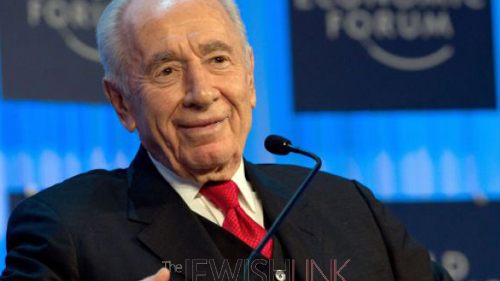
DAVOS – Israeli President Shimon Peres sharply addressed the speech made by the Iranian President Hassan Rouhani at the World Economic Forum at Davos, Switzerland on Thursday morning, January 23.
“The most significant remarks were the ones he [Rouhani] didn’t make – he didn’t express support for peace in the Middle East,” the 91-year-old Israeli president stated in press conference he held with international and Israeli press at the World Economic Forum, following Rouhani’s speech.
“He is the only leader I know who didn’t say clearly that the time has come to make peace between Israel and the Arabs,” pointed out Peres.
Peres also noted that Rouhani had “excluded with a smile the reference to peace made by [WEF Chairman Klaus Schwab] and when asked if his vision included all countries, he [Rouhani] said it included only the countries that Teheran will accept. That is some definition.”
“He didn’t announce that in order to reduce the bloodshed in Syria he’s going to stop sending arms and money to Hezbollah to the stop the killing. He could have announced that seeing as he doesn’t want a nuclear bomb that he will stop building long range missiles capable of carrying nuclear warheads. He didn’t announce that Iran will stop being the center of terror in our time,” noted Peres.
Peres said that Israel was ready to make peace with the Iranian people and that historically they have never been enemies. “We extend our hand for peace, including to the Iranian people, but today was a great occasion that was missed.”
In response to questions from the press President Peres said Rouhani’s speech was, “half a job and the most important half wasn’t done.”
“Peace is peace for all people, without exclusion. President Rouhani doesn’t need the P5+1 to stop building missiles; he doesn’t need their permission to stop sending arms to Hezbollah and elsewhere. There is an offer on the table to enable Iran to have what other countries have but they have to stop threatening and terrorizing, even while making speeches like this one. There is no room to postpone.”
Rouhani, who was elected President of the Islamic Republic last year, declared during his Davos address that “I strongly and clearly state that nuclear weapons have no place in our security strategy and Iran has no motivation to move in that direction.”
In 2002, an Iranian dissident group known as the M.E.K. obtained and shared documents revealing a clandestine nuclear program that had been previously unknown to the United Nations. The program included a vast uranium enrichment plant at Nantaz and the United States then accused Tehran of an “across-the-board pursuit of weapons of mass destruction.”
In 2010, the United Nations’ nuclear inspectors declared that they have extensive evidence that Iran’s military was developing a nuclear warhead. In 2012, Iran stated that it was building 3,000 uranium-enrichment centrifuges at the Nantaz plant. And in April 2013, Iran announced an expansion of its nuclear fuel production and other atomic energy advances.
By Anav Silverman
Tazpit News Agency